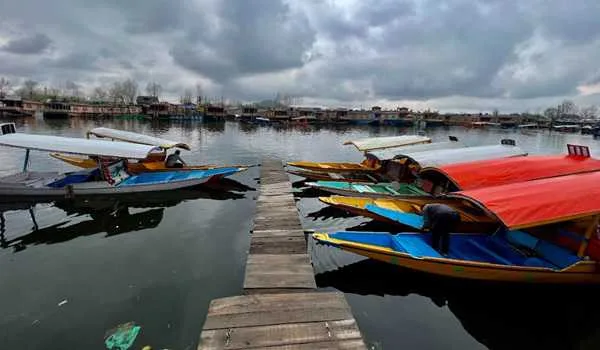Srinagar: Barring two brief spells of snow, the 40-day-long harshest winter period known as “Chillai Kalan” concluded in the Kashmir Valley overnight on a dry note.
Traditionally marked by heavy snowfalls and freezing conditions, this year’s “Chillai Kalan” deviated significantly from its typical pattern. The region witnessed a substantial deficit in rainfall and snowfall, raising serious concerns about water scarcity in the months ahead.
“This January, Jammu and Kashmir recorded a rainfall and snowfall deficit of about 75 to 80 percent,” Dr. Mukhtar Ahmad, Director of the Meteorological Centre in Srinagar, told UNI.
This year saw only 25 to 30 percent of the usual precipitation. The unusually dry conditions, coupled with the significant precipitation shortfall, have set this winter apart from previous ones.
This year saw extreme temperatures during the “Chillai Kalan” period, with Srinagar experiencing lows of minus 8.5°C while some areas of South Kashmir witnessed even colder conditions, with temperatures plummeting to minus 10°C.
Instead of snow-covered streets and frosty mornings, the valley was hit with high temperatures that were more typical of spring, with daytime highs reaching 15°C during mid-January—nearly 8°C above the average winter temperature.
“This year, we saw variations in rainfall and snowfall. While we received heavy snow and rain towards the end of December and into early January, the latter part of the month saw more moderate conditions”, Ahmad said.
Ahmad said “the average temperatures in the Kashmir Valley have increased by approximately 1.5°C over the years. This may seem small, but it has a significant impact on the environment, including the melting of glaciers and depletion of water resources.” He said changing weather patterns caused a reduction in snowfall.
“Snowfall, which is crucial for replenishing water reserves, has been lower than usual in some areas. As temperatures rise, we are also witnessing a reduction in the duration of snow cover, which further impacts water reserves, both for consumption and agriculture”, he said.
“If this pattern continues, we may face water scarcity and other environmental issues in the coming decades”, Ahmad added.
Ahmad stated that pollution and global weather shifts are also affecting the region.
“The snowfall is working like a lifeline for the Himalayan region”, he said adding “if there is no snow the economy which is directly dependent on it like tourism, Agriculture, Horticulture sectors will badly affect”.
He said snowfall not only recharging our glaciers but also makes us sufficient in ground water reservoirs. “If there could not be timely snowfall, it can badly hit all these things”, he added.
Ahmad said the rate of recitation of glaciers is very high as compared to recharge due to climate change and increasing global temperatures during the past many years have caused great concerns on the rate of less precipitation.
The higher reaches of the Kashmir valley experienced heavy snowfall, but the plains remained largely dry, with only light to moderate snow accumulation. Srinagar, the summer capital of Jammu and Kashmir, received light snowfall during the “Chillai Kalan” this year.
Harshest part of winter “Chillai Kalan” ends on dry note, warmer days in Kashmir
A
A


